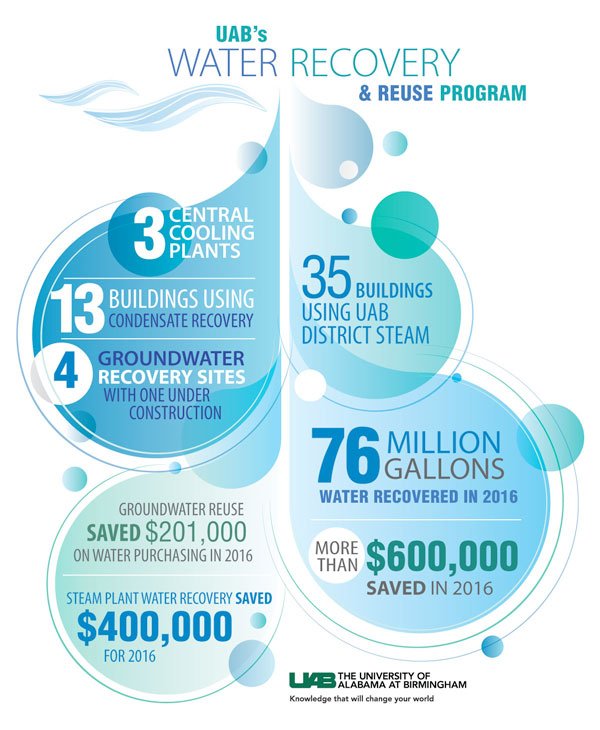Written by: Tiffany Westry
Need more info? Contact us
 The University of Alabama at Birmingham has been highlighted in the 2017 Sustainable Campus Index for water conservation, recycling and reuse, and effective rainwater management practices.
The University of Alabama at Birmingham has been highlighted in the 2017 Sustainable Campus Index for water conservation, recycling and reuse, and effective rainwater management practices.
The 2017 Sustainable Campus Index, a publication of the Association for the Advancement of Sustainability in Higher Education or AASHE, highlights innovative and high-impact initiatives from colleges and universities.
“It’s very rewarding to have the opportunity to work at an institution that places such a high emphasis on sustainability,” said Matt Winslett, director of Facilities Management. “UAB’s water recovery efforts have been some of the most rewarding projects I have been a part of to date.”
UAB’s Water Reuse and Recovery Program emphasizes year-round water conservation through a network of tanks and piping to capture and reuse groundwater and condensate from heating and cooling systems. In 2016, UAB saved about 76 million gallons of water and more than $600,000.
The system consists of three central cooling plants and multiple cooling towers that are linked via a network of underground piping. Water from the plants is cooled to 45 degrees Fahrenheit. The heat is removed from the water through evaporation within the plant’s cooling towers, and the water is then piped into buildings to provide air conditioning. Afterward, the water is warmed to 55 degrees Fahrenheit, creating condensate that forms on the air handler coils as it leaves the buildings.
The condensate is collected, filtered, cleaned and pumped across town to UAB’s district chilled water plant’s cooling tower through the underground chilled water-return line. This both conserves water use and reduces the volume of municipal drinking water that must be purchased for cooling. The cold, mineral-free, distilled water also contributes to lower water treatment costs, as well as the input energy required in the cooling process.
“UAB’s feature in this report shows its significant leadership and commitment to advance sustainability,” said AASHE Executive Director Meghan Fay Zahniser. “We are excited to recognize UAB for working to secure a thriving, equitable and ecologically healthy world through its comprehensive sustainability efforts.”
In 2016, UAB earned a rating of “Silver” in the Sustainability Tracking, Assessment and Rating System or STARS program, for its efforts in public engagement and innovation. STARS is a self-reporting sustainability evaluation tool developed by AASHE. The system measures and encourages sustainability in all aspects of higher education.
The STARS program is the most widely recognized framework in the world for publicly reporting comprehensive information related to a college or university’s sustainability performance.